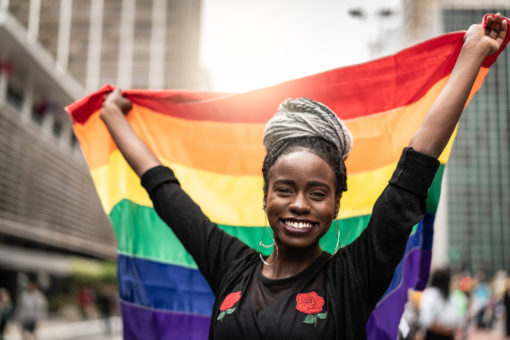For many, the holidays are an exciting time to gather with family and friends that one may not see throughout the year. These gatherings are usually spent enjoying food, sharing stories and exchanging gifts. For some, the holidays can be a triggering time of year. Especially when individuals are not close to their family, do not have any family or feel judged by their family.
Many individuals in the LGBTQ community are rejected or removed from their families just for expressing their true identity. Unfortunately, the holiday season does not change the fact that family members and friends around the dinner table may mistreat LGBTQ individuals. For many in the LGBTQ community, feelings of guilt begin to surface around the holidays about not wanting to spend time with family members because of the stigma and judgment that goes hand in hand with holiday family gatherings.
It can be extremely triggering to be forced into remembering a childhood where homophobia and transphobia, and even unintentional antagonisms, were the standard. These feelings can create a plethora of anxiety and can also bring back traumatic memories from the past. Of course, the hope would be that all family members would accept their loved one for who they are, regardless of their sexual orientation, religion, race or political views, but for many, this is not reality. There are two healthy options: avoid family gatherings if you feel antagonized and isolated, or set strict boundaries for your loved ones during the holiday season.
Mental health statistics in the LGTBQ community
- Of all U.S. adults aged 18 and over, 96.6% identify as straight, 1.6% as gay or lesbian, 0.7% as bisexual, and the remaining 1.1% as “something else.”
- 38-65% of transgender individuals experience suicidal ideation.
- LGBT youth are four times more likely to attempt suicide, experience suicidal thoughts, and engage in self-harm, as compared to youths that are straight.
- LGBTQ individuals are almost three times more likely than others to experience a mental health condition such as major depression or generalized anxiety disorder.
- The LGBTQ community is at a higher risk for suicide because they lack peer support and face harassment, mental health conditions and substance abuse.
- The LGBT community is at a higher risk of bullying and has even been the center point for violent attacks.
Being LGBTQ and setting boundaries around the holidays
Setting boundaries for yourself when attending family gatherings around the holidays is essential. Regardless if you are a part of the LGBTQ community or not, family gatherings can be stressful and can potentially create a lot of turmoil. If you are part of the LGBTQ community, you are more at risk of being judged and stigmatized at these family gatherings. If you do choose to attend, it is important to set strict boundaries for yourself and others.
· Do not shrink: It is easy to not mention your sexual orientation or your lifestyle around the dinner table out of fear you may be rejected. However, it is important not to be ignored. You are part of the family, and therefore you should be able to discuss what has been happening in your life, even if it involves your same-sex partner. Do not be afraid to share your accomplishments with your family.
· Do discuss: If someone asks about your lifestyle, then openly discuss it. Share your happiness. You may be surprised that by being open and discussing who you are, many people may be interested and can throw their judgments out the window.
· Don’t entertain: Unfortunately, there may be homophobic language or jokes around the dinner table, and this is not okay. You should not allow this talk or behavior, and it is essential to speak up and hold others accountable for their language. They may be doing this without cruel intentions, or they may be ignorant of their behavior. If you speak up during this time, you may change their future behaviors and words and save someone else from a lot of hurt and stigma.
· Allow yourself to check out: If you feel you are being ridiculed, judged or stigmatized, permit yourself to leave. You do not have to apologize or give an excuse, but you should never put up with this behavior. You must stand up and protect yourself and your mental health.
At Discovery Mood & Anxiety Program, we know that the holidays can be a difficult time for those in the LGBTQ community. If you need support this holiday season, contact us today.
Kristen Fuller, M.D., is a clinical content writer and enjoys writing about evidence-based topics in the cutting-edge world of mental health and addiction medicine. She is a family medicine physician and author, who also teaches and contributes to medicine board education. Her passion lies within educating the public on preventable diseases, including mental health disorders and the stigma associated with them. She is also an outdoor activist and spends most of her free time empowering other women to get outside into the backcountry.
